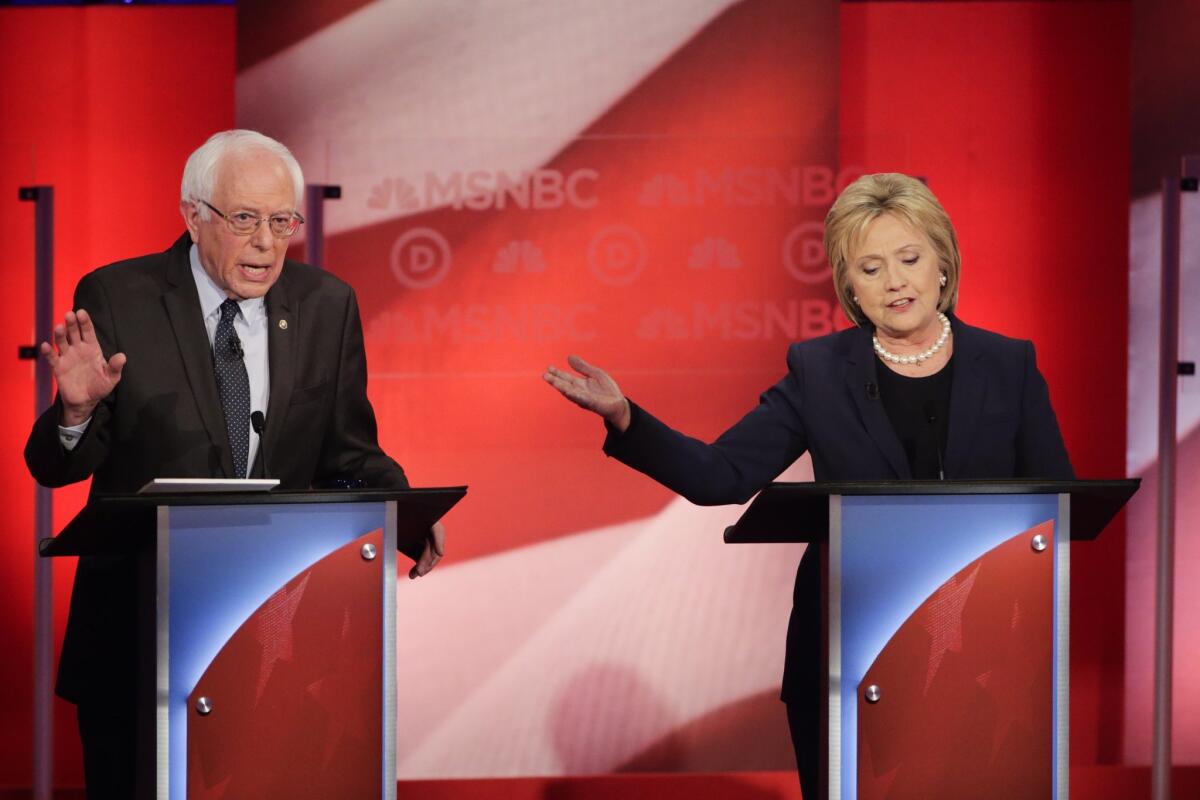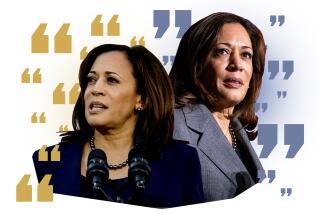Opinion: The problem with Hillary Clinton’s stance on the death penalty

Democratic presidential candidates Bernie Sanders and Hillary Clinton briefly address the death penalty during Thursday’s Democratic debate. The issue should be explored more often.
Thursday night’s Democratic presidential debate included one brief exchange that showed some overlap but also a sharp philosophical difference between Hillary Clinton and Bernie Sanders on a persistently fractious issue: the death penalty.
The exchange came in response to a question by co-moderator Rachel Maddow, who asked Clinton whether she still stood by an earlier statement in which she “reluctantly” endorsed capital punishment.
“Yes, I do. And — you know, what I hope the Supreme Court will do is make it absolutely clear that any state that continues capital punishment either must meet the highest standards of evidentiary proof of effective assistance of counsel or they cannot continue it because that, to me, is the real dividing line.
“I have much more confidence in the federal system, and I do reserve it for particularly heinous crimes in the federal system, like terrorism. I have strong feelings about that. I thought it was appropriate after a very thorough trial that Timothy McVeigh received the death penalty for blowing up the Federal Building in Oklahoma City, killing 168 people, including 19 children in a day-care center.
“I do for very limited, particularly heinous crimes believe it is an appropriate punishment, but I deeply disagree with the way that too many states are still implementing it. If it were possible to separate the federal from the state system by the Supreme Court, that would, I think, be an appropriate outcome.”
Sanders staked out the opposite turf from Clinton, arguing that the death penalty is too prone to error to be trusted but also said more broadly that “of course there are barbaric acts out there. But in a world of so much violence and killing, I just don’t believe that government itself should be part of the killing.”
To her credit, Clinton has said she “would breathe a sigh of relief” if the Supreme Court were to ban the practice. But there are two underlying problems with her position as staked out Thursday night. First is the implication that effective counsel is all it takes to guarantee a fair trial, when many of the death penalty exonerations we’ve seen in recent years have hinged on prosecutorial or investigative misconduct (including hiding potentially exculpatory evidence from the defense) and lying witnesses. Even the best defense lawyers will have trouble overcoming such practices.
Second is Clinton’s suggestion that somehow the federal system has got it right on how to get a clean conviction and a method of execution that is not unconstitutionally cruel and unusual. She cited the case of McVeigh, whose atrocious act of anti-government terrorism killed 168 people, including children at a day-care center, in the federal Alfred P. Murrah Building in Oklahoma City in 1995. That was a heinous act of terrorism, and she called his execution “appropriate.”
But it’s only appropriate if you view vengeance as the purview of the state. McVeigh was irredeemable and caused unimaginable pain and loss, but that doesn’t mean it was just for the government to kill him in return. If killing is wrong, then it’s inconsistent to vest that power in the state. That’s the moral argument against the death penalty. The pragmatic one — expensive, indiscriminate, prone to manipulation — doesn’t inherently give the federal system a pass. In an adversarial judicial system, the goal is to win as much as it is to reach truth and justice.
Since McVeigh’s execution, the federal government has put to death two more men: Juan Raul Garza just eight days after McVeigh in 2001, and Louis Jones Jr. in 2003. Neither involved terrorism.
In the first case, the government executed Garza despite international protests that the courts had allowed the prosecutor to tell the jury that Garza, a major drug-trafficker convicted of ordering the murders of two people and killing a third himself, was a suspect in more murders in Mexico — crimes for which he had never been charged and for which he could not mount a defense during the sentencing hearing. Would the jury have voted for death without that information? Who knows, but insinuation should not be evidence in determining whether someone lives or dies.
The execution of Jones was even more problematic. A highly decorated Gulf War vet with diagnosed psychiatric problems from his service, Jones’ life fell apart after the war, propelled largely by his exposure to chemical agents. He was convicted of the 1995 rape and murder of a 19-year-old female Army recruit on a military base. A horrific crime, yes, but it seems to fall outside Clinton’s endorsement of capital punishment “for particularly heinous crimes in the federal system, like terrorism.”
And there’s nothing to suggest that the federal system can’t fall victim to the same sorts of manipulations that dog the state courts. And the federal death row includes people convicted of the same kinds of murders for which state courts invoke the death penalty. In fact, the only person on federal death row convicted of terrorism killings is Dzhokhar Tsarnaev, the surviving Boston bomber.
Minorities also make up a disproportionate number of federal sentences (44% black, 39% white, 13% Latino and 2% Native American). It’s hard to see much daylight between the federal and state capital punishment systems, other than a matter of scale. The 60 people currently under a federal death sentence (these are the eligible crimes) are dwarfed by the estimated 2,950 people on state death rows.
The death penalty isn’t likely to be a pivotal issue in the nominating contests for either major party, nor in the general election. That’s unfortunate. It’s among the most pressing ethical issues of the day, and challenges to it could well bring more cases to the Supreme Court in the relatively near future.
As it is, Florida and Delaware are struggling to reconfigure their systems after a recent Supreme Court decision that juries and not a judge must determine death sentences. And here in California, voters may have a choice of two death-penalty initiatives, one to ban it and the other to speed up the execution calendar.
More candidates ought to be talking about it, and more voters should be bringing it up. And I hope Clinton will re-think her stance on it.
Follow Scott Martelle on Twitter @smartelle.
More to Read
A cure for the common opinion
Get thought-provoking perspectives with our weekly newsletter.
You may occasionally receive promotional content from the Los Angeles Times.











